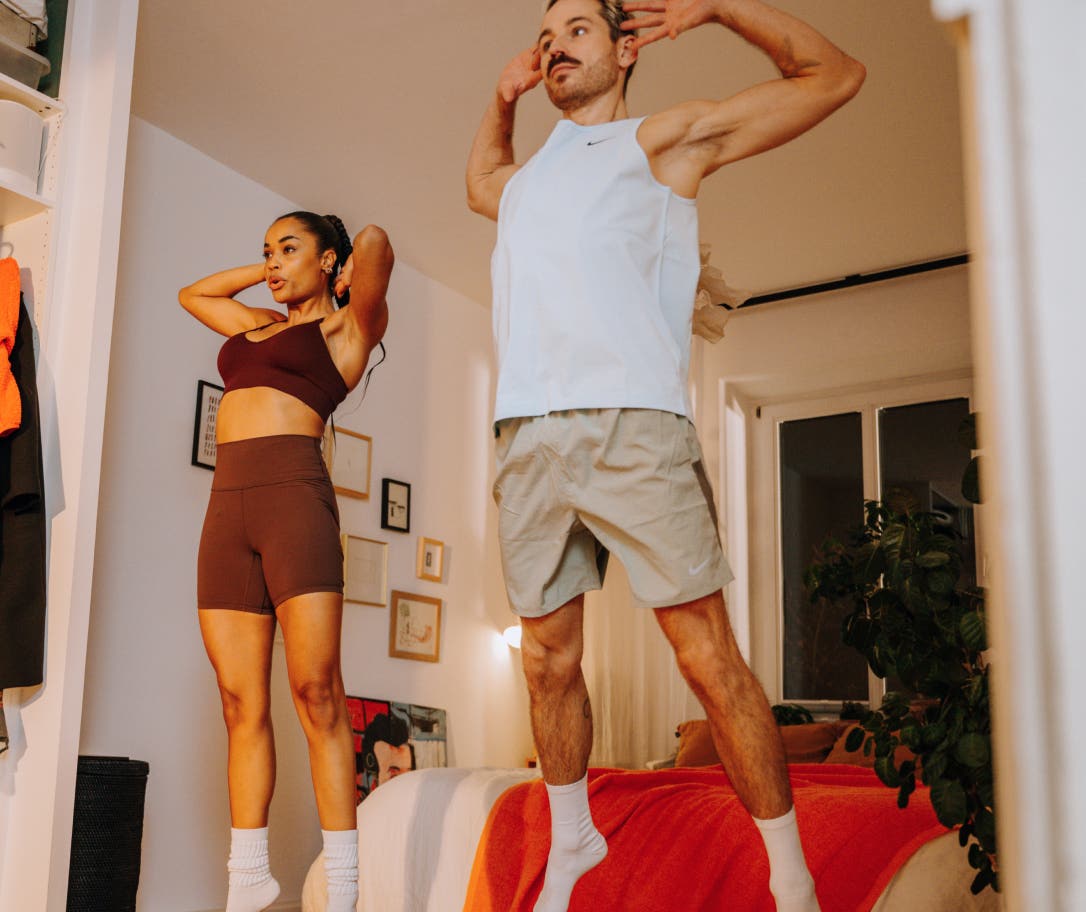You might think training is just another stressor. But in reality, it’s one of the most effective tools to cope with stress. Even a short walk or quick workout can lower cortisol levels while boosting endorphins, serotonin, and dopamine – the neurotransmitters that elevate your mood.
And it’s precisely when life feels stressful or uncertain that moving your body can make all the difference.
Why stress can throw us off track
Have you ever noticed how your body goes into alarm mode even when there’s no immediate danger? Your heart races, muscles tighten, and your thoughts start spinning. That’s exactly how stress works. Biologically, this reaction makes sense – our bodies evolved to respond this way, preparing us for fight or flight.
The problem is: modern stressors like deadlines, worries, or uncertainty can’t be fought or fled from. They linger and with them, the tension.
One of the hardest parts is the sense of losing control. Feeling like nothing can change feels overwhelming. This is exactly where movement helps: it creates a space where you can take action. You decide to move. You regain influence – and that simple fact brings relief to your mind.
To put it simply: movement gives you back a piece of control. Even if you can’t change external circumstances, you can still choose to act for yourself and your overall health.

How movement affects the body and mind
Beyond the chemical changes physical activity triggers in the body, it also creates moments when you’re able to be fully present with yourself. Here are some additional benefits movement has to offer:
- Structure: A workout gives your day orientation. In the midst of chaos, you have something to hold on to.
- Self-efficacy: Every session, no matter how brief, tells you, “I can make a difference.” A strong antidote to feeling helpless.
- Presence: Training pulls you into the here and now. Breath, muscles, rhythm – for a while, worries fade away.
- Recovery: Movement supports your nervous system, improves sleep, and strengthens your body over time.
- Mood: Just 20 minutes of moderate intensity activity can be enough to bring lightness back to your life.
And what’s truly remarkable is how powerful these effects are. Studies show that regular activity reduces the risk of falling into depressive patterns and also acts as a shield for your mental health against daily stress.
That’s why training is about more than just staying fit. It becomes a resource that supports you – especially when everything else feels uncertain.
How training can be an anchor in tough times
Training isn’t just about peak performance or breaking records. Even the simplest form of exercise can give you the stability you need to navigate stressful situations or challenging phases of life by providing:
- Routine: Small rituals, like a morning run or evening stretch, can provide structure and consistency.
- Relief: Emotions like frustration, fear, or sadness can be released through physical activity.
- Balance: Movement restores equilibrium, often leaving you feeling clearer, calmer, and more grounded.
- Community: Whether in-person or online – being active together fosters connection and support that strengthens you.
Sharing the experience with others amplifies its impact. Invite friends or family and spend time together by doing something active. Training becomes not just something for yourself, but also a symbol of togetherness.

How to keep moving in tough times
The hardest part of working out is often just starting. When you’re tired or stressed, training can seem like an impossible hurdle. But it doesn’t have to be – quite the opposite. The trick is to consciously lower the bar. Here’s how:
- Start small. Yes, five minutes are enough. A short walk, a few bodyweight Squats, stretching – your body will notice the difference immediately.
- Focus on routine, not intensity. Consistency beats perfection. Small efforts, done often, matter most.
- Use everyday opportunities. Take the stairs, do short stretch breaks between meetings, or simply prioritize moving outside in the fresh air.
- Breathe consciously. Breathing exercises or gentle movements calm your nervous system just as effectively as intense workouts.
- Celebrate each step. Every session is a win – proof that you’re not giving up on yourself.
Make movement something positive. Pair it with music you love, with fresh air, or with a place you enjoy. This way, it doesn’t feel like a chore but becomes a little break you look forward to.
And remember, variety is key. Try yoga one day and a run the next. Changing things up keeps it interesting and prevents your routine from feeling stale.

What the science says about it
Research confirms what many already feel: movement acts like a shield. People who are active report greater emotional stability, satisfaction, and resilience. Even short bouts of moderate activity – just 10 to 15 minutes of walking – can have measurable effects.
Neurobiologically, physical activity strengthens networks in the brain that regulate emotions. It boosts neurotransmitters linked to motivation and reward. In short, movement doesn’t just make you feel better in the moment – it builds resilience for the future.
The best part? These benefits are universal, regardless of fitness level. Both beginners and experienced athletes alike benefit from movement – the only difference is how movement fits into their lives. Whether it’s an easy walk or a structured workout, both are valuable.
Key takeaways for when it feels hard
There will always be days when everything feels too heavy. And on those days, that’s when it helps to ask yourself: “What is the smallest step I can take today?” Maybe it’s just five minutes. Maybe it’s a few deep breaths. Both count and every little bit matters.
It’s not about perfection. It’s about proving to yourself: “I keep moving. I remain capable. I stay strong.”
Start small. Stay consistent. Let movement be your anchor. Because a single session, no matter how short, sends a message to yourself. It shows that you don’t give up, that you matter to yourself.
And if you need to pause? That’s okay. Every new start counts. Movement is with you for life – you can always begin again.